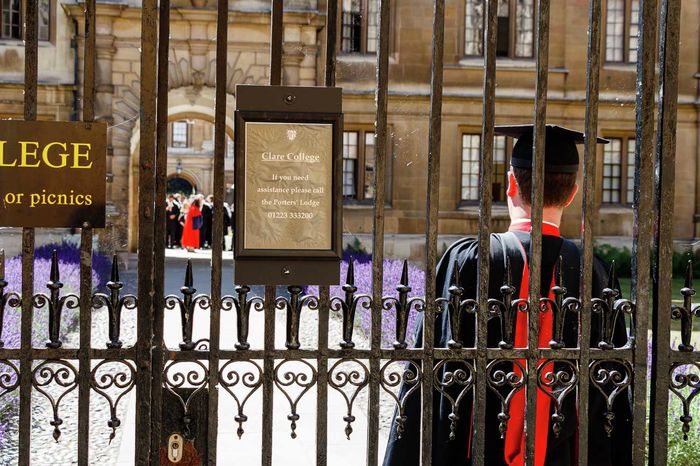Let’s stop pretending drinking socs can be inclusive
Drinking societies will always been designed to suit the elite, argues Fatima Zahra Yusuf

As a woman of colour at the University of Cambridge, I’ve been asked, to my surprise, to join a drinking society. Being at Lucy Cavendish means that it is not as intense, and I haven't heard any horror stories in comparison to the older colleges. However, every single time, I politely decline. I’ve come to the realisation that these institutions are fundamentally incapable of providing the genuine sisterhood and support they claim to offer.
The core problem lies in the very nature of these exclusive clubs. The process of who makes it into the society is inherently problematic. And it’s no coincidence that this “select” group almost always aligns with the dominant, privileged demographic – white, middle-class, privately educated individuals. To be fair, there are individuals within these societies who are not that, and come from more diverse backgrounds and attempt to challenge the status quo. The issue lies in the fact that the core foundation of these institutions is fundamentally rotten. Despite how well-intentioned the efforts, the deeply entrenched structures and exclusive mentalities cannot be overcome through isolated actions alone. No matter how many black, working-class, or otherwise marginalised women these societies invite to join their ranks, the systemic issues will persist.
“The core foundation of these institutions is fundamentally rotten”
Sesame, a notorious venue on Hills Road, has become emblematic of these deeply problematic social dynamics. Here, interactions are not spontaneous or genuine but engineered to create uncomfortable, performative experiences. One of my friends has told me how one of the events is handcuffing women to men – sexualising women’s participation and reducing complex human relationships to heteronormative performance pieces. I often hear that people dread these events, highlighting a fundamental disconnect between the societies’ self-perception and the lived experiences of their members. What is presented as social bonding and ‘girlie fun’ is in reality a structured environment that fundamentally compromises personal dignity and safety. The narrative surrounding drinking societies needs a radical reimagining, and the main way to do that is to de-normalise this culture.
These drinking societies are not just exclusive in terms of socioeconomic and racial backgrounds, but also in their adherence to narrow, heteronormative ideals. Queer, transgender, and non-binary individuals often find themselves on the margins, with little to no representation or space for their experiences and identities. They are simply not a space for anyone who does not fit the mold of the quintessential “St Paul’s girl”.
There are so many things at Cambridge to offer that do not include interacting with societies that have historically excluded people of colour, or those from a disadvantaged background. A recent find of mine is Cambridge Dance, a monthly-ish dance night, probably the best nights out in Cambridge. I eagerly await for the next one, however the point being made here is that there are so many amazing, empowering nights out that do not revolve around you doing weird fines and being chained up to a boy.
“The narrative surrounding drinking societies needs a radical reimagining”
Though Cambridge may not rival the nightlife of Bristol or Manchester, we have so many thoughtfully curated events open to everyone. When people defend drinking societies, part of the appeal likely lies in the sense of belonging they create. And I understand that appeal; I, too, felt a sense of validation at being invited to one of their events. Even if I haven’t completely shaken off the fear of missing out, that sense of affirmation resonates. These societies feed on the desire for social recognition — a feeling that is undeniably powerful, but one that can also be fulfilled in inclusive, welcoming spaces.
What frustrates me most is when people see these issues clearly yet continue to participate. This is the weakest form of activism: wanting change without embodying it. Criticising a system while showing up each week undermines any real allyship.
Until these drinking societies are willing to confront the deeply rooted biases and power structures that underpin their very existence, any attempts at inclusivity will ring hollow. They may be able to point to a few “diverse” members, but the reality is that these individuals are often expected to assimilate and conform to the dominant culture, rather than being truly embraced and empowered.
I’ve come to the realisation that my vision of sisterhood is fundamentally at odds with the exclusive nature of these drinking societies. The swaps ,which are quite regressive in my opinion, being tied to a man and essentially encouraged to get with someone are just not my kind of thing, and it is far more deeper than ‘just a bit of fun’. So, when I’m invited to join a drinking society, I will carry on and say no. I want more people to actually clock this before they accept an invite.
 News / Colleges charge different rents for the same Castle Street accommodation2 March 2026
News / Colleges charge different rents for the same Castle Street accommodation2 March 2026 News / News in Brief: waterworks, wine woes, and workplace wins 1 March 2026
News / News in Brief: waterworks, wine woes, and workplace wins 1 March 2026 News / Climate activists protest for ‘ethical careers policy’1 March 2026
News / Climate activists protest for ‘ethical careers policy’1 March 2026 News / Angela Merkel among Cambridge honorary degree nominees27 February 2026
News / Angela Merkel among Cambridge honorary degree nominees27 February 2026 News / Private school teacher who lied about Cambridge degree barred from teaching27 February 2026
News / Private school teacher who lied about Cambridge degree barred from teaching27 February 2026









